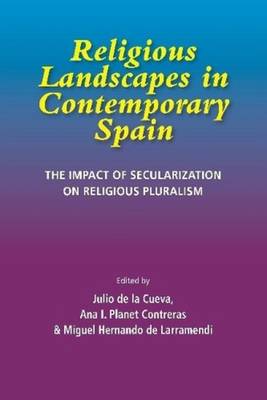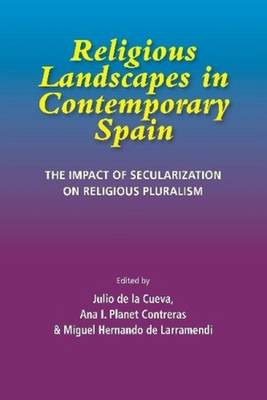
- Afhalen na 1 uur in een winkel met voorraad
- Gratis thuislevering in België vanaf € 30
- Ruim aanbod met 7 miljoen producten
- Afhalen na 1 uur in een winkel met voorraad
- Gratis thuislevering in België vanaf € 30
- Ruim aanbod met 7 miljoen producten
Zoeken
Religious Landscapes in Contemporary Spain
The Impact of Secularization on Religious Pluralism
€ 55,95
+ 111 punten
Omschrijving
Spain is no longer exclusively identified with Catholicism. This book sets out to understand the social dynamics of twenty-first century Spain through the perspective of religion and religious pluralism. Divided into three parts, Part I, Secularization in Spain, frames the analysis of this secularization process throughout the twentieth century and beyond, with particular attention to the process during the Second Republic and the quiet secularization of society that began under Franco's regime. Part II, Religious Change in Spain, establishes the broad framework of the process, addressing the changes that have taken place within Catholicism and the reaction of the Protestant minority as social mores became increasingly fast moving. Part III, Islam in Spain, addresses both its history (including colonial management) and current dynamics (how Islam is viewed by other religions; the impact of the March 11, 2004, attacks; and Islamophobic discourse). Religious Landscapes in Contemporary Spain is essential reading for scholars and students in History and Contemporary Affairs.
Specificaties
Betrokkenen
- Uitgeverij:
Inhoud
- Aantal bladzijden:
- 300
- Taal:
- Engels
- Reeks:
Eigenschappen
- Productcode (EAN):
- 9781789761634
- Verschijningsdatum:
- 13/06/2022
- Uitvoering:
- Paperback
- Formaat:
- Trade paperback (VS)
- Afmetingen:
- 152 mm x 229 mm
- Gewicht:
- 403 g

Alleen bij Standaard Boekhandel
+ 111 punten op je klantenkaart van Standaard Boekhandel
Beoordelingen
We publiceren alleen reviews die voldoen aan de voorwaarden voor reviews. Bekijk onze voorwaarden voor reviews.










